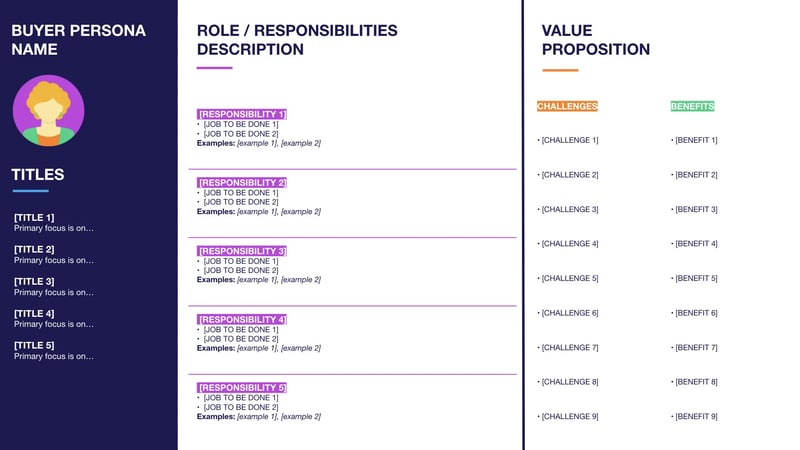April 14, 2022
The Ultimate Guide to Sales Qualification: Steps and Questions
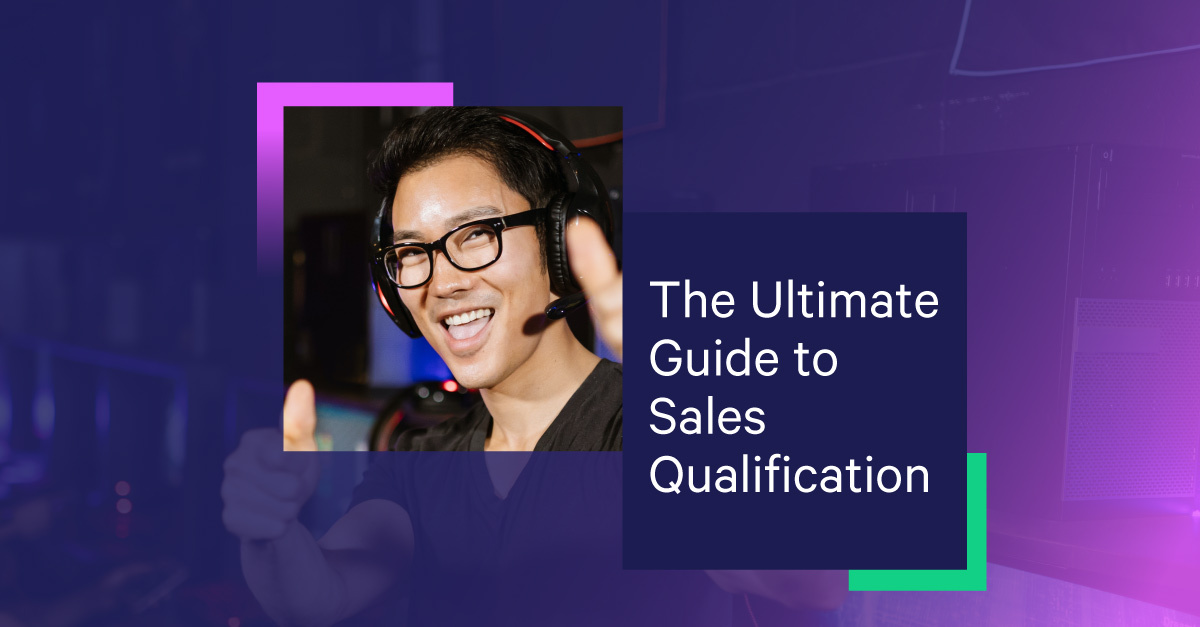
- What is sales qualification?
- Why is sales qualification important?
- What are the stages of the sales qualification process?
- 5 Sales qualification frameworks to help qualify prospects
- 33 Sales qualification questions to ask prospects
- Wrapping up
- Frequently asked questions about sales qualification
Too many salespeople waste valuable time and resources going after leads that are unlikely to convert.
Which hampers your teams’ ability to hit quota.
However, asking just a few sales qualification questions can ensure you place more high-quality opportunities in your pipeline.
At Mixmax, we sell to salespeople so we know how important (and hard) it is to maximize the chances of sales prospecting success.
We reached out to salespeople on our team and in our network to sales qualification best practices. Read on to understand:
What is sales qualification?
Sales qualification is the process of making sure prospects are genuinely a good fit for your solution. That means they’re experiencing pain you can solve, and match your ideal customer profile (ICP) as closely as possible. It involves checking things like company type, industry, prospect role, need, budget, buyer authority, etc.
Sales qualification should happen early in sales prospecting, ideally before an SDR passes a prospect on to the AE. Depending on your sales processes, though, it may overlap with the sales discovery process (though it shouldn’t).
Of course, it’s never a bad idea to ask questions of the buyer at any time, not just in the early stages of the sales cycle and beyond to ensure there are no missed opportunities.
Sales qualification is usually done by an SDR or AE on a cold call, although other channels like messaging, email, and LinkedIn are good for information gathering, pre-qualification, and “warming up” calls.
Inbound leads are partly qualified because they showed interest by interacting with your content or filling in a form, but a human still has to qualify them before they’re placed in the pipe.
For outbound prospecting, qualification starts much earlier, when RevOps or a similar role gathers data to calculate your total addressable market (TAM) and define buyer personas.
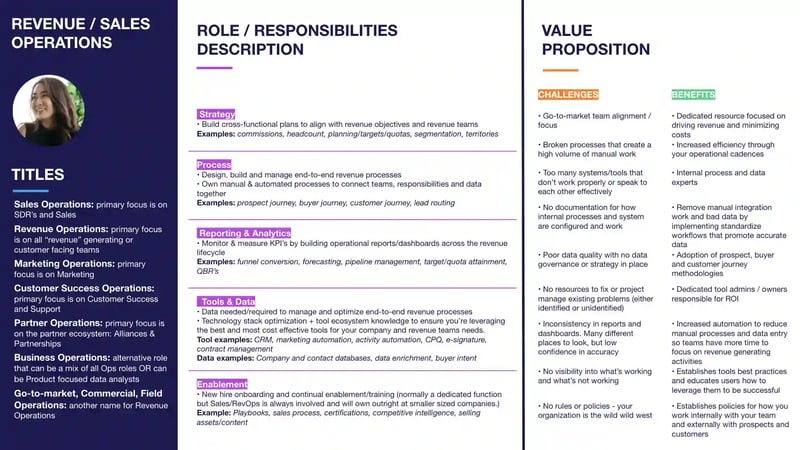
Buyer persona example
Why is sales qualification important?
Sales qualification is important because it helps avoid wasting time on prospects who are unlikely to convert, and lets you prioritize those who are. It also allows you to focus on a smaller segment of high-value prospects to offer a more personalized experience.
Sales qualification allows you to gather firmographic and technographic information to determine whether a company is worth pursuing. And, of course, establish whether their pain points match what you offer if they’re in a position to buy, and who you need to get in the room to move the deal forward.
As David Martirosian, Co-founder of Big Time Closer says, “You need to be able to separate ‘This prospect sounded like a great lead’ vs. ‘this prospect is a great lead, because they ticked all the boxes.’”
“The biggest challenge is probably discerning if the prospect is a serious buyer or just kicking tires,” says Vincent Burruano, President of Vince Burruano Consulting Services, “asking questions to uncover what the prospect values will determine whether your offering aligns with what they want to achieve.”
“If you offer a great product, with excellent service, but are the most expensive in the market, it probably doesn’t make sense to work with someone who doesn’t value quality and wants the cheapest price. Can you convince some people to change their mind? Yes, but the odds are stacked against you. You’re better off looking for prospects more aligned to your value proposition than to spend excess time trying to change someone's mind.”
Sales qualification also allows you to bring problems to your prospect’s attention (they may be experiencing pain without being aware of the cause). And, of course, introduce them to your solution (though this is definitely not the right time to pitch).
What are the stages of the sales qualification process?
How you approach the sales qualification process will depend on your company, sales cycle, and teams.
Here’s what we recommend:
1. Define your ICP and buyer personas
Identify which type of company is a good fit for your solution. That means they have a need you can answer.
To do this, start by creating an ideal customer profile (ICP) with firmographics of your target company. Then, develop buyer personas focusing on individual prospects’ roles, responsibilities, challenges, and your value proposition.
This should be a collaborative process between Marketing, Sales, Product, and RevOps. That’s a lot of cooks in the kitchen, but these people take the vision of your ideal customer and transmit it to revenue teams, so you want them in the room.
Think about the functions your prospect performs, and their day-to-day processes, strategies, tools, and reporting procedures. What challenges do they face, and how can they benefit from your solution? Remember to include any common variations on their job title, and any overlapping or potentially confusing roles with similar titles.
Use this free, editable template to create sales buyer personas based on their role and responsibilities, and your value prop
Buyer personas like these help SDRs and AEs identify potential customers and personalize communications, handle objections, and create highly relevant sequences. And the more relevant a message is for the recipient, the more likely they are to engage with it.
2. Set qualifying criteria
Decide which boxes need to be checked before a sales lead is placed in the pipe, and set guidelines or provide a checklist for salespeople to evaluate them. These might include criteria like fit, buying authority, urgency, budget, etc.
You may find it helpful to use a sales qualification framework (more on these below) or draft some sales qualification questions to guide conversations (also below).
3. Set up your tech stack
There’s a lot to keep on top of, so you need to invest in tools to:
- Track and manage leads and sales activity, like a CRM.
- Research prospects and enrich your data.
- Capture and verify contact information.
- Assign a score to inbound leads based on engagement so sales teams can prioritize them based on who’s most likely to convert.
- Automate and streamline outreach and follow-up.
Mixmax has a lot of cool features that help with the last point, like sending LinkedIn messages, dialing numbers, and sharing videos, polls & surveys, and calendar links right from your Gmail inbox. It also integrates with popular sales tools and syncs with your CRM so you know you’re always working with up-to-date information.
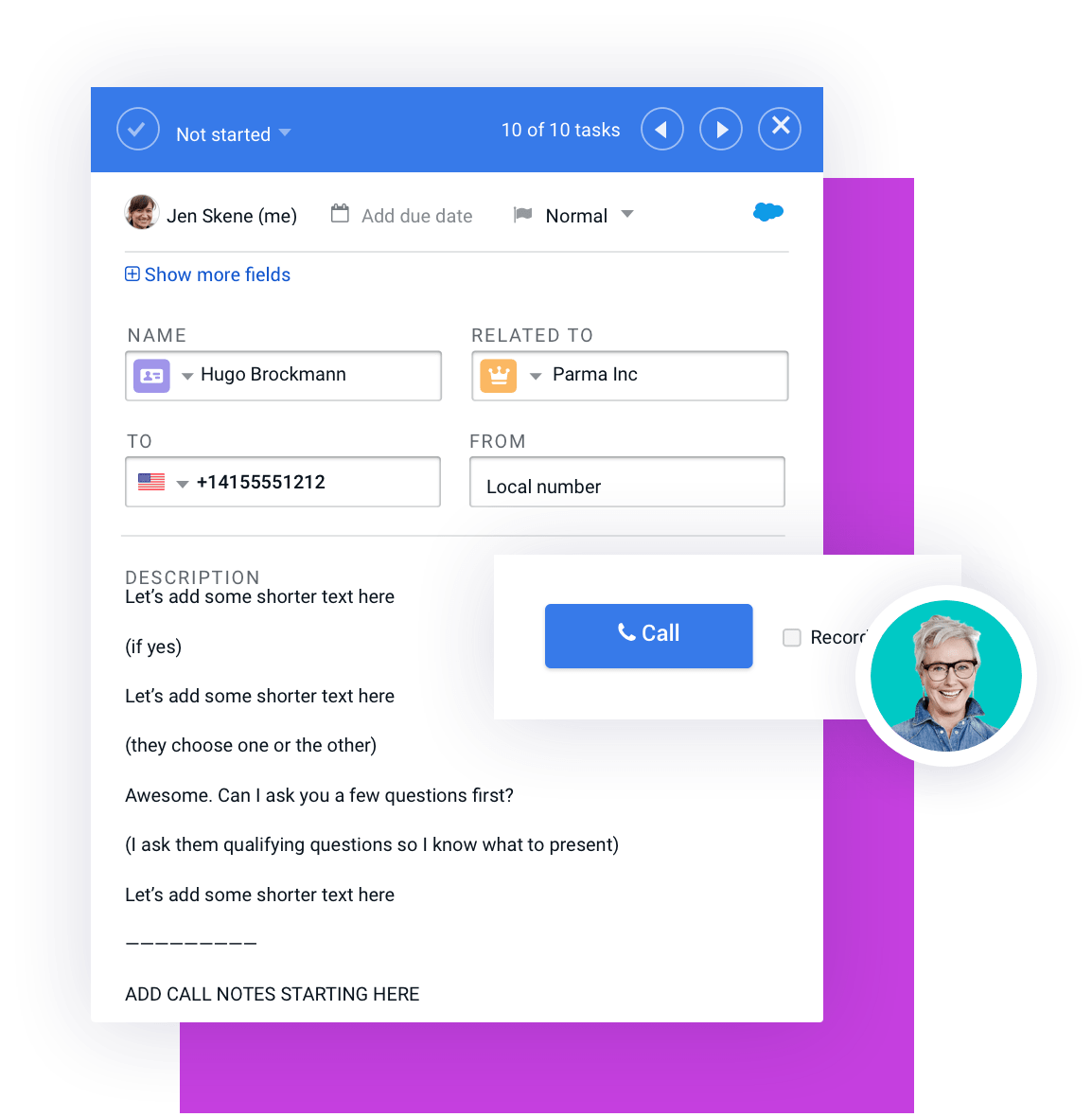
4. Do your research
In this day and tech-enabled age, there’s no excuse for salespeople to reach out without having first checked out prospects’ roles, social media activity, company news, reports, etc., etc. These insights are invaluable for personalizing outreach, guiding the conversation, and ensuring you come over as someone who can walk and chew gum at the same time.
5. Reach out
Once you’ve identified prospects who could be a good fit, and prioritized inbound leads, the next step is to contact them.
Whether qualification happens in a cold call or another channel, you’re aiming to achieve one or more of the following:
- Identify pain.
- Get firmographic and technographic information.
- Assess budget, need, and interest.
- Understand timeframes.
- Understand the decision process, and who’s involved.
- Find out how they might use your solution.
The last point is where qualification can bleed into sales discovery questions, but it’s important to find out as soon as possible. Mixmax allows you to collaborate and engage people right from your Gmail inbox, but that doesn’t mean every company using Gmail is a fit for us. If they want to use it for marketing, for example, it’s unlikely to serve their needs.

6. Decide whether you need to go deeper
There’s a misconception that qualification has to happen in a single cold call, but we see it as more of a multi-step, multi-person process.
Why? Well, your first contact should be short (5-7 mins is ideal) to avoid overwhelming prospects, so you might not get all the qualifying info you need. That means you’ll need to set up a second call to go deeper.
You might also start a conversation with one person, gather enough information to decide it’s worth pursuing, and continue the conversation with a decision-maker to finally qualify them in or out.
Also, you might get a “no” from your initial prospect, but a “yes” from someone else in the company. We’ve reached out to sales teams in the past only to hear they’re planning to renew with our competitor. When we talk to customer success, though, we sometimes find they’re less thrilled about maintaining the status quo.
It’s also not just about timing. Some accounts are so well qualified that you want to pursue them and stay top of mind even if they’re not in a position to buy yet. When that happens, just drop them into a customizable re-engagement sequence in Mixmax so you don’t forget to follow up further down the line.
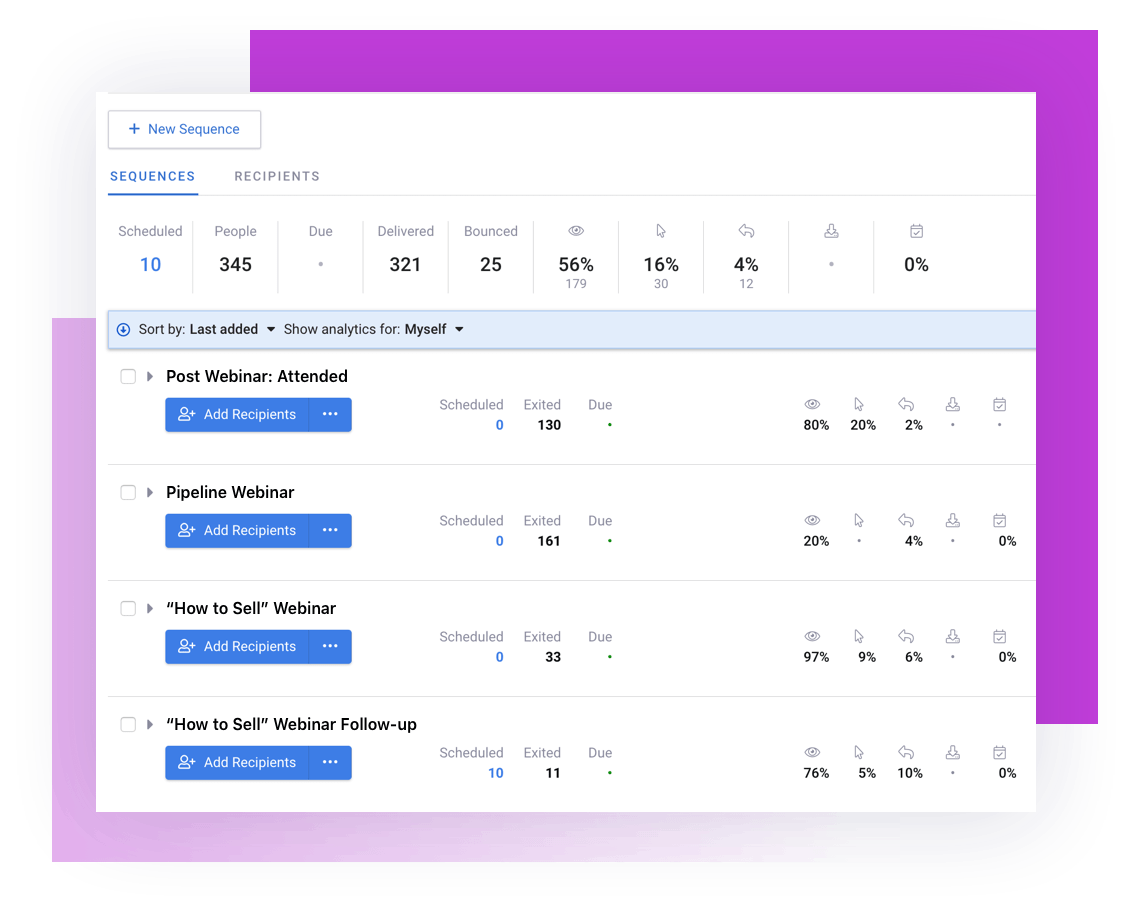
7. Establish next steps
If sales qualifying has gone well, the next step is to set up a discovery call to find out more. Make sure to find out now whether you need to loop anyone else in the company in.
|
Want to streamline your sales process from qualification to renewal and expansion? Mixmax automates repetitive and manual tasks to save time and help you stay on top of follow-up. |
Related Post: Discovery Call Checklist: 12 Steps for a Strong Sales Discovery
5 Sales qualification frameworks to help qualify prospects
Let’s be clear here, everyone’s sales processes are different, so never think you have to stick to a rigid framework or call script.
That said, each customer and sale are different, but closed-won deals tend to have certain things in common. So using a sales qualification framework can help you identify which traits to look for.
Here are a few commonly used frameworks.
BANT
A time-honored sales qualification framework, this acronym works for a variety of companies and markets, and stands for:
- Budget - Is the potential customer able to buy?
- Authority - Are they the right person to sign off the deal? (If not, you’ll need to find out who else to target.)
- Need - Do they have pain you can solve?
- Timeline - When are they likely to buy? (Important not to be too rigid here; as mentioned above, there are times you want to pursue a prospect even if they won’t boost your results this quarter/year.)
Arranged in order of priority, BANT covers all the essential answers you need to extract from prospects. The criteria tend to complement each other, too. If there’s a need and budget, it’s probably the right time to buy.
Note, though, that you may not need to check all these boxes at once. Sometimes it’s enough just to get a toe in the door and see where that takes you.
ANUM
This is an alternative spin on BANT, which stands for:
- Authority - As above, but here it’s moved up in the list of priorities.
- Need - As above.
- Urgency - As in “How urgently do they need to solve their problems?”
- Money - as in “Show me the.”
SPICED
Here’s a sizzling hot way to qualify your prospects, which is partly qualification and partly discovery.
It stands for:
- Situation - AKA who are you targeting and why? Situation encompasses all the background information about your prospect—tools they use, teams they’re responsible for, their industry, company size, etc.---that helps establish them as a good fit.
- Pain - How can you help them? What specific challenges are they facing that would make your product or service look like an attractive solution?
For example, at Mixmax, we look for sales teams that are spending too much time manually personalizing communications. That means they can benefit from our automation features like customizable sequences, email templates, and rules for workflow automation.
- Impact - What would life look like if you solved their pain for them, and what do they stand to gain by buying your product? Can you save them time, boost productivity and efficiency, cut costs, etc.?
- Critical Event - This is similar to Timeframe/Urgency. So, what’s the cutoff to find a solution for this problem (end of quarter/year, for example)? And what happens if they don’t?
- Decision - This relates to how purchase decisions are made. With enterprise prospecting or large deals, you can expect several stakeholders to be involved. So you need to understand their decision criteria and the approval process.
CHAMP
CHAMP focuses on similar criteria to BANT and ANUM.
- CHallenges - As in, “what’s the biggest challenge you’re facing right now?”
- Authority - If you’re not already talking to the decision-maker, use this call to understand their org chart and find out who to target.
- Money - Have they got the cash to splash?
- Prioritization - Where does this issue stand in the line of things they need to solve? This is good to establish as it lets you know what you’re competing against; it’s not always your competitors.
FAINT
No, it’s not what happens when they see your quote. Instead, this acronym stands for:
- Funds - Focusing on Funds rather than Budget recognizes the fact that many purchase decisions are unplanned. Therefore, it makes sense to look for organizations with the capacity to buy, rather than ones with a defined budget allocated for solutions like yours.
- Authority - As above.
- Interest - Adding this into the mix, lets you know how keen they are to find a solution to their problems.
- Needs - As above.
- Timing - Similar to Timeframe as outlined in BANT.
You’ll see other acronyms—MEDDIC, SPIN, GPCTBA/C&I (let us know if you figure out the pronunciation)—lumped in on other listicles. We don’t consider those true sales qualification frameworks, though, as they overlap too much with discovery. Plus, there’s no way you’re getting all the info they require in a short call.
Sales qualification frameworks have their uses, but always make sure the criteria correspond to your needs and sales cycle. A simple framework like BANT is less helpful for long sales cycles, for example. Think about what makes a good opportunity for your company.
At the end of the day, the biggest qualification criteria is Need. If that’s there but you’re talking to someone who doesn't know about the budget or lacks purchase authority, no problem. Take those insights, find out who you need to speak to, and target them. Be genuinely curious about what’s going on with them and how you can help, too, which will get you way further than any checklist.
33 Sales qualification questions to ask prospects
Again, never stick exclusively to a script here. Sales qualification questions should be customized according to how you identify a good opportunity. Some businesses have a long sales cycle with highly customized products, so it pays to start conversations with potential customers early on. Other prospects won’t talk to you unless they have a budget allocated and you can deliver in the next 30 days.
Use sales prospecting techniques like listening more than you talk (aim for an 80-20 ratio), and avoid close-ended questions that only require a yes/no answer.
“In general,” says Vince Burruano, “you want to ask ‘open-ended’ questions that allow the prospect to share additional information. Take the time to encourage further details and discussion. Often, it’s not the first thing the prospect offers, but the third or fourth that contains the real nugget of information that will help you better serve their needs.”
Here are a few examples:
To gather technographic data
1. Do you use [X, Y, Z product/solution]?
2. Which tools are you using to [perform common task]?
To gather firmographic data
3. How many employees do you have in the company?
4. How many [employee role] work in [department]?
To divine pain, challenges, and needs
5. I know a lot of [companies in prospect’s industry] are using [common but ineffective solution] to manage [common challenge], or maybe a custom system. Is that what you're using, and what do you think of it?
6. We’ve heard about some common issues regarding [common task/problem]. Do these apply to your situation?
7. How are you managing [common task or challenge] today?
8. How’s [current solution] working out for you?
9. How much time are you spending on [common problem]? What would it mean if that time could be allocated elsewhere?
10. Why hasn’t [problem] been addressed before?
11. What would it take to solve [problem]?
12. If [common problem] was resolved, what would that mean for you?
13. What are you looking for in a potential future solution?
To establish budget
14. Do you have a budget for [area your solution falls in]? What is it?
15. Is [challenge or need] an important enough priority to allocate funds toward?
16. What other areas are you currently spending on?
17. Does seasonality affect your funding?
18. Our product typically costs [X]; is that something you'd be able to handle?
To understand the decision-making process
You need to tread carefully here. Never ask someone directly if they are the decision-maker as this can sound insulting while failing to provide accurate information. Instead, query how decisions about projects/products/services like this are generally made. Diving into this type of information will tell you where the prospect sits in the overall decision-making process.
19. Whose budget does this purchase come out of?
20. How have you made purchasing decisions for products similar to ours in the past?
21. Which stakeholders are generally involved in evaluating potential options?
22. Is there anyone else I should share this information with?
23. Is there anyone else we should loop into the next meeting?

To establish timeline or urgency
24. How quickly do you need to solve [problem]?
25. What else is a top priority at the moment?
26. Are you evaluating any other similar products or services?
27. Do you have the capacity to implement [your solution] right now?
28. When will you begin implementing this plan?
29. Do you have bandwidth and resources to implement this plan now?
30. When do you need to find a solution for [problem]? What happens if you don’t?
31. How will not taking any action (or not changing from the current situation) impact your business?
32. When are you looking to have [your product/solution] implemented?
33. If our product provided a solution to [current problem], would you be ready to move on it now?
For all these categories, start with exploratory questions before narrowing down to focus on your specific solution area. For example, if you’re selling a sales automation solution, start with questions about how they’re managing their pipeline and what issues they’re facing. Then drill down into specific issues where your product offers a better solution. This will tell you if the prospect is already using a competitor and whether there is interest in considering yours.
Wrapping up
The B2B sales qualification process is your chance to determine how good a fit prospects are for your solution, and whether they’re worth your time. It’s an essential part of the sales process that should be done before discovery to save time and tears further down the line.
Sales qualification usually happens in a cold call, but it starts way before that with defining your ICP, researching your prospects, and determining what counts as a good opportunity for your company.
Sure, sales qualification frameworks, checklists, and lists of questions can help you guide conversations, but don’t be tied to them. And never lose sight of the most important factor for sales success: being genuinely interested in your prospects and curious about how you can help.
And, of course, it never hurts to automate tedious manual tasks and streamline outreach by using a sales engagement platform like Mixmax. That goes without saying (but, yeah, we thought we’d say it anyway).
Frequently asked questions about sales qualification
What is the sales qualification stage?
The sales qualification stage is a vital step between researching leads and prospects and holding a discovery meeting. Sales qualification is designed to identify those leads and prospects that have a genuine need for your solution, so you know whether they’re worth investing your time in.
What is a qualified sales opportunity?
A qualified sales opportunity has a genuine need for your product or service and, ideally, the budget and authority to buy, although these are not always essential at the outset. Need is really the most important factor in deciding whether to pursue an opportunity.
How do you qualify customers in sales?
You qualify customers in sales by researching them to see if they fit your ideal customer profile and could need your product or service. Then, reach out to them (usually via a cold call) to ask qualifying questions. These questions help establish pain points and how your solution could help. You might also ask about budget, timelines, and the buying process in the same call.
What is a sales qualification framework
A sales qualification framework is a set of criteria that helps qualify or disqualify prospects. The BANT framework is one of the best-known. It stands for Budget, Authority, Need, Timing.
The answers to framework questions establish things like whether there is a need for your product or service, where the prospect sits in the decision-making process, and whether they have the budget to pay for it. Framework questions also establish how urgent it is for them to find a solution to their problems, and what their challenges are, among other things.
Thanks for insights and info to:
Vincent Burruano
David Martirosian
Kingston Vickers
Serg Valencia
Vishal Srivastava
You deserve a spike in replies, meetings booked, and deals won.
Sign up to The Mixer newsletterSign up to our newsletter to get fresh sales content delivered right to your inbox.
Recent Posts
Once upon a time in a galaxy far, far away, Yesware was the go-to solution for AEs doing email outreach.
Times change.
And, while it’s made a valiant effort, Yesware just hasn’t been agile enough to maintain its position.

Sure, Yesware bills itself as a sales engagement solution but, truth is, the features leave a little something to be desired.
Ok, a lot.
Truth is, these days, it’s just not part of the sales engagement conversation anymore.

